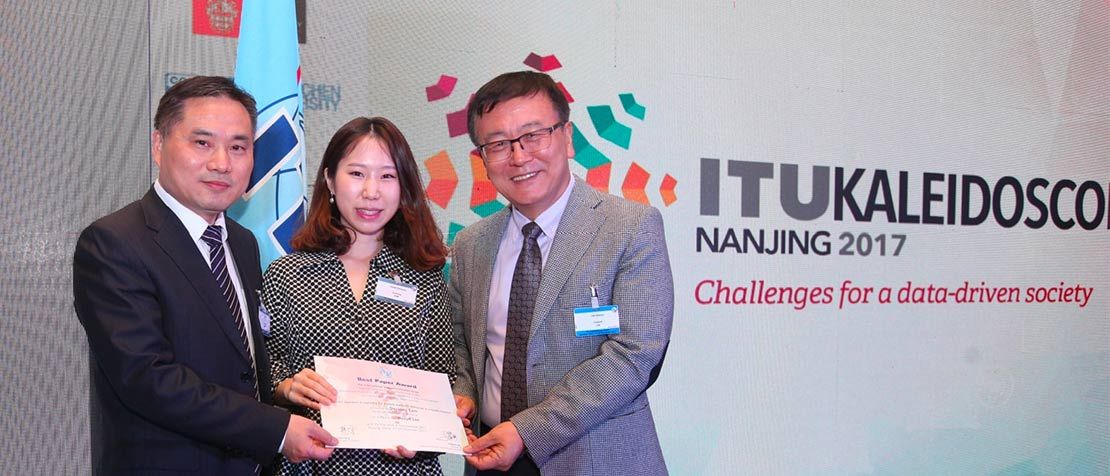
Yonsei University’s e-health research claims 1st prize at Kaleidoscope 2017
Doyoung Eom and Heejin Lee of Korea’s Yonsei University have claimed 1st prize at Kaleidoscope 2017 for their review of research into e-health standards and integration of related findings, an exercise intended to bring more cohesion to analyses of standards’ contribution to ICT-enabled healthcare innovation.
All papers presented at the conference can be found in the Kaleidoscope 2017 Proceedings.
Kaleidoscope events are peer-reviewed academic conferences that increase dialogue between academics and ICT standardization experts. The conference identifies emerging trends in ICT research and their implications for international standardization.
ITU Kaleidoscope 2017: Challenges for a data-driven society, the ninth edition of the Kaleidoscope conference, explored innovative approaches to data management and analysis. The conference was held in Nanjing, China, 27-29 November, hosted by the Nanjing University of Posts and Telecommunications.
1st prize: ‘A holistic approach to exploring the divided standards landscape in e-health research’
The winning paper highlights that the growing volume of research into e-health standards has not been matched with broader analysis of the common themes appearing in such research. The paper shares the results of a review of 84 articles, integrating their findings into three major identified themes: comparisons of the role played by e-health standards in developed and developing countries; analyses of the types and effects of e-health standards; and studies into the factors influencing the adoption of e-health standards.
2nd prize: ‘Socio-economics and educational case study with cost-effective IoT campus by the use of wearable, tablet, cloud and open e-learning services’
The 2nd prize paper – authored by Toshiki Ueda and Yoshikazu Ikeda of Japan’s Otani University – presents a case study of the ability of tablets and wearable e-health devices to decrease universities’ costs and support a more dynamic education experience. Tablets assisted the distribution of course materials, encouraged interactive communication among professors and students, and enabled students to capitalize on open databases and e-learning services. Wearable e-health devices were shown to assist the planning of university services and encourage healthy behaviours known to contribute to successful study habits.
3rd prize: ‘Fostering smart city development in developing nations: A crime series data analytics approach’
The 3rd prize paper – authored by Omowunmi E. Isafiade and Antoine Bigomokero Bagula of South Africa’s University of the Western Cape – presents a novel crime clustering model, ‘CriClust’, based on a dual threshold scheme, to detect and map patterns in crime data and thus derive useful knowledge from crime datasets. The CriClust model was developed with the intention of assisting security agencies in combating crime in low-resource environments. The model identifies patterns in crime data to assist the anticipation of criminal behaviour and the development of evidence-based policy.
Thanks to the Kaleidoscope community
Kaleidoscope 2017 attracted over 300 attendees from 26 countries. The 23 papers selected for presentation at the conference are published in the Kaleidoscope 2017 Proceedings as well as the IEEE Xplore Digital Library.
Extended versions of selected papers will be considered for publication in the ITU Journal: ICT Discoveries and IEEE Communications Standards Magazine, as well as the International Journal of Technology Marketing, the International Journal of Standardization Research and the Journal of ICT Standardization.
The papers presented at Kaleidoscope 2017 were selected by an 80-member Technical Programme Committee using a double-blind peer-review process, under the leadership of a Steering Committee.
Kaleidoscope 2017 was organized by ITU and technically co-sponsored by the Institute of Electrical and Electronics Engineers (IEEE), IEEE Communications Society and the International Conference on Standardization and Innovation in Information Technology (SIIT 2017).
The conference was sponsored by Jiangsu Institute of Communications, New H3C Technologies, Nanjing Fiberhome Starrysky and Nanjing Ironhorse Information Technology.
Additional support was received from the Chair of Communication and Distributed Systems at RWTH Aachen University; Chongqing University; Chongqing University of Posts and Telecommunications; the Competition Law Center of the University of International Business and Economics; the European Academy for Standardization; Hubei University; the Institute of Computing Technology of the Chinese Academy of Science; the Institute of Electronics, Information and Communication Engineers of Japan; the Institute of Image Electronics Engineers of Japan; Royal Holloway University of London; UNESCO Chair in ICT for Development; University of the Basque Country; Waseda University; and Zhejiang University.
